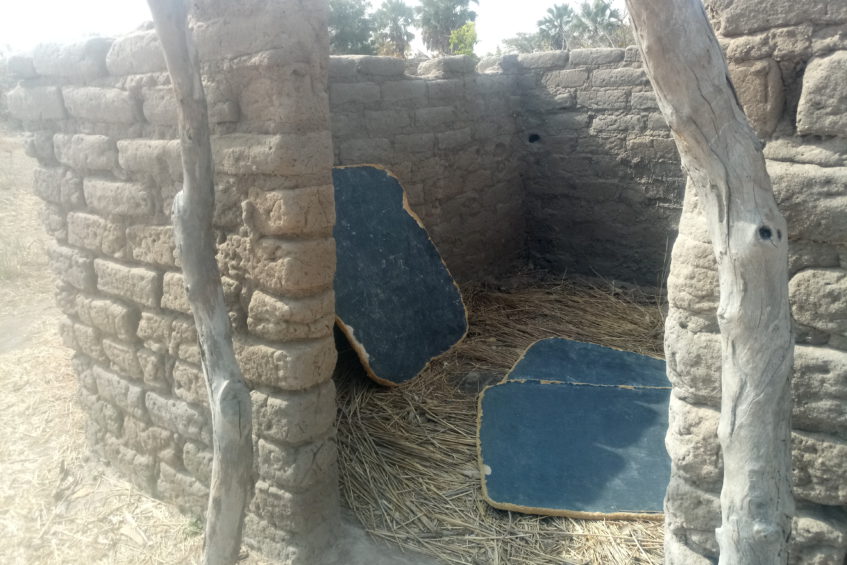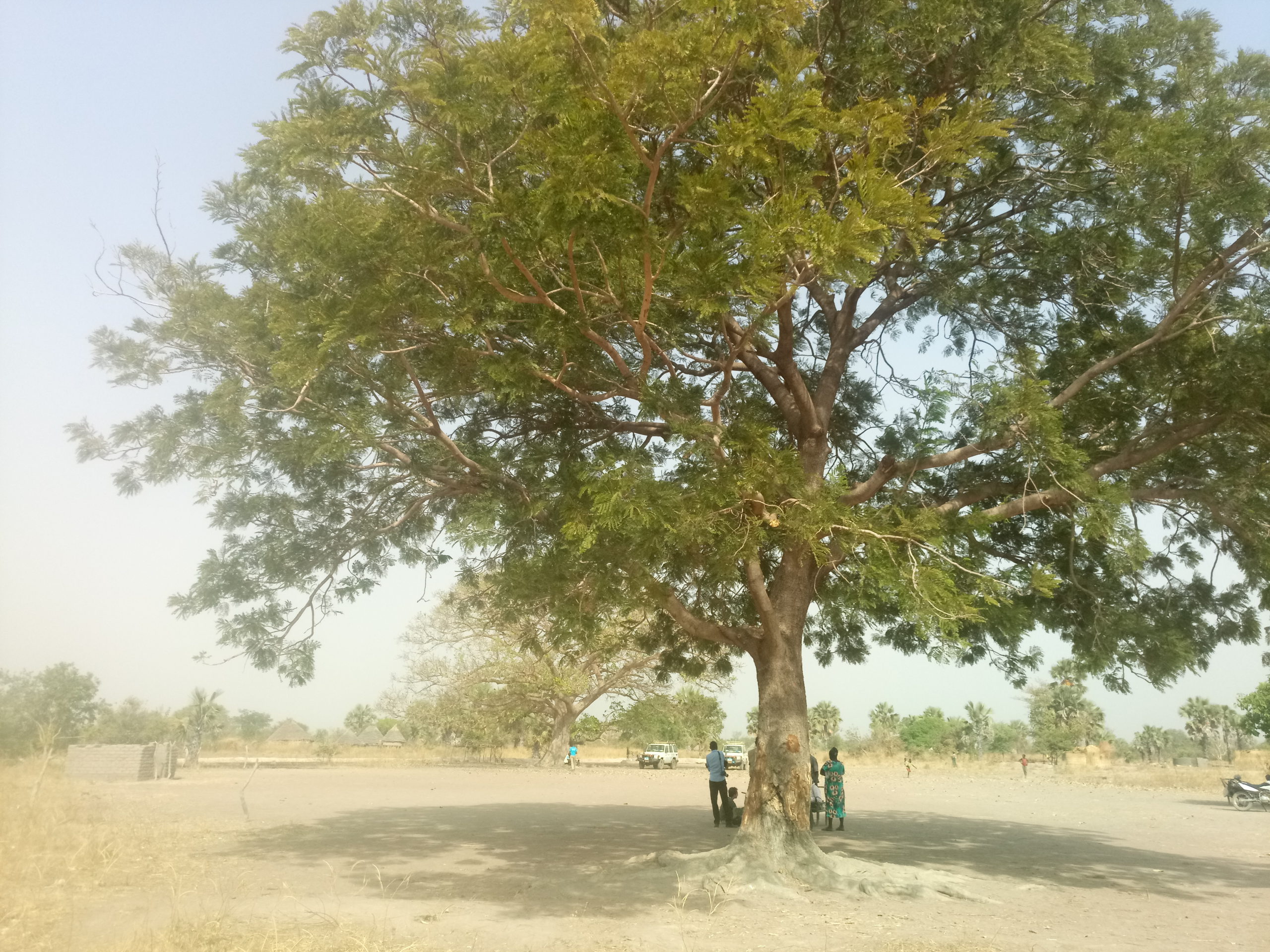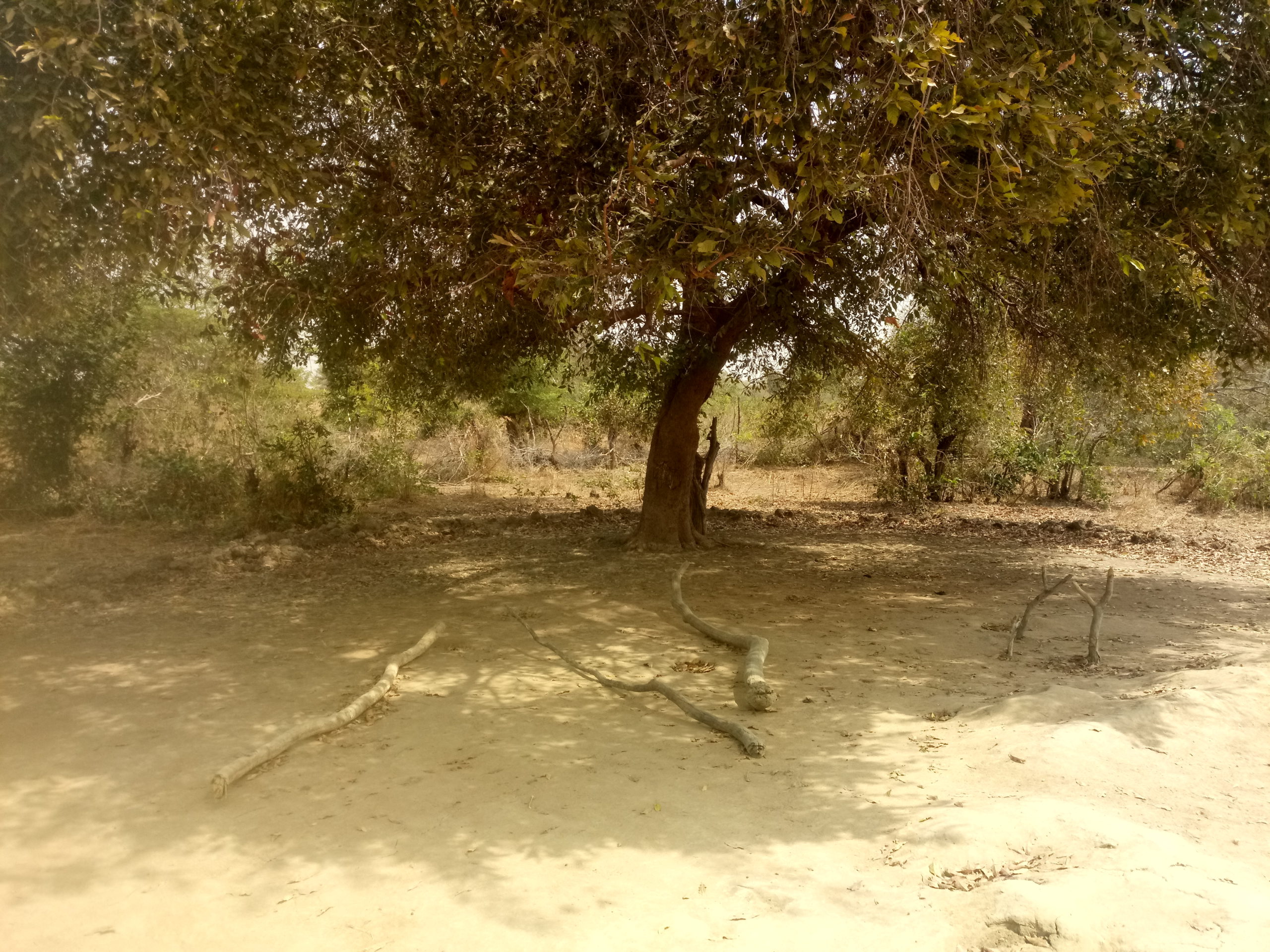
One of the school structures used for storing school materials at Malual Aduet primary school situated about 3 kilometers west of Malek-Alel, Aweil South County headquarters. Credit: Charles Wote/Eye Radio
The UN children’s agency – UNICEF has announced plans to construct over 2000 classrooms in conflict and flood devastated areas where schools are operating under the trees.
This comes after the agency reported that there are about 2,024 schools operating under the trees across the country due to multiple reasons.
It says some of the learning facilities in some parts of the country submerged while others collapsed last year due to continued floods.
Others also got damaged during the violence.
Muhammed Riaz, UNICEF’s Education Specialist in South Sudan says Upper Nile, Jonglei, Unity state, Northern Bahr el Ghazal, Warrap and Western Equatoria are the priorities.
“This year, we have plans for 2,000 classrooms to be constructed in all the ten locations. So the schools have been identified and we are planning to construct this year,” Riaz said.
“We are prioritizing those areas like the flood-affected locations and locations where there is high damage to school buildings, so we will be prioritizing those locations.
“Those locations are basically Upper Nile, Jonglei, Unity state, Northern Bahr el Ghazal, and Warrap. We will also support other locations where school buildings have been damaged due to conflict or other reasons.”
Last year, torrential rains across the country caused havoc in several parts of the country where Jonglei, Upper Nile, Unity were the most affected states.
According to a report by the UN Office for the Coordination of Humanitarian Affairs, an estimated million people have so far been affected by the flash floods in 27 counties.
In Northern Bahr el Ghazal state for example, local officials in Aweil South say out of the 87 schools in the area, about 67 are operating under the trees after the learning structures collapsed due to flood waters.
Pankar primary school situated about 45 kilometers east of Aweil South county is among the over 2000 schools operating under the trees due to lack of learning shelters.
This school relies on the three trees within the school compound that provides shade for the learners to attend lessons.

Despite having lessons under the trees, Pankar primary school has a total of 487 learners registered for Primary one to Primary seven.
Out of the 487, there are about 253 girls and 234 boys who are regularly attending lessons at Pankar primary school.
Learners in these classes are sitting on a wood of about 5 meters, fixed between two different poles.
Santino Aleu Deng, the school head teacher told Eye Radio that the local made tukuls collapsed last year due to flooding in the area.
“We are using some trees here as classes because we don’t have shelter. They all fall down, that is why we are using trees for lessons,” Teacher Aleu said.
“We have only three blackboards we are sharing among the 7 classes because we don’t have many blackboards. For example, you give a lesson in primary 1 or primary 7 then you take it again to another class.”

Before the flood devastated the area, Pankar primary school had five local classrooms constructed by the communities.
The communities used local materials in the area for the construction which reportedly collapsed last year due to persistent rainfall.
Established by the government in 1995, Pankar primary school serves as the only basic school for the communities in this area.
Peter Deng Majok, Chairperson for Parent and Teachers Association at Pankar said they are now mobilizing communities to construct another tukuls before the rainy season.
Deng argues that this is not enough.
“The flood devastated this area from July to October last year. It displaced most of the people here and they run to the nearby villages which contain high ground,”
“As the chairperson of the PTA in this primary school, I am now mobilizing the communities since the school building has all collapsed because of the flood.
“The communities have started coming with some poles and they are still bringing many so that we can construct temporary classes for our children.”
Tito Wek Ayok, head teacher of Malual Aduet primary school said in addition to the flood, learning structures in his school collapsed during the lockdown.
Situated about 3 kilometers west of Malek-Alel, the Aweil South County headquarters, Wek said the 550 registered learners are attending classes under the trees.
“The classrooms were constructed locally in 2008 by the communities but after the lockdown due to the coronavirus, all the facilities were destroyed by the ants that is why there is no any building in the compound,” Wek said.
“Despite the fact that there are no classrooms, all the learners are here and are attending the lessons well. As I am speaking to you now, we have 3 classes operating under this tree and the other tree also has other 3 classes.
“Every morning we divide the pupils according to the six classes and they just sit here under the tree.”
Malual Aduet primary school contains two major trees in the compound, bore hole and a dyke that were built by the community to divert water from the school compound.
The compound of 100 square meters contains only one unfinished building which is equivalent to 3×3 meters built of bricks.
According to Eye Radio reporter who visited the school compound, the unfinished building is used for keeping three blackboards of the school.
Basic schools in Aweil South County and other parts of the country are also experiencing lack of qualified teachers, lack of school materials which left learners hopeless.
Yohana Akol Wek, Senior Inspector for Basic Education in Aweil South County confirmed the challenges facing schools in the county.
“It is worse because the flood has affected many schools in the rural areas. Most of them [schools] have collapsed and learners were displaced. Some of them left the school, they did not sit for the examination because of the flood,” Akol said.
“Right now the statistics for Aweil South this year have been reduced because of the impact of the flood. Parents in most of the areas moved away from nearby schools and they went to higher grounds to settle there.”
However, UNICEF said the Agency intends to construct over 50 temporary classrooms in Northern Bahr el Ghazal using local materials.
This Muhammed Riaz said will be easily managed by the communities.
“In Aweil, we have a plan to construct some temporary learning spaces for some 50 schools and this is the plan. I don’t have the exact figure but that is the plan,” Riaz said.
“We are supporting a temporary structure that will last at least 3 – 4 years and communities can repair it easily. It is locally constructed and materials are locally available so this is one intervention.”
UNICEF, however, says despite securing $8.1 million, the agency still requires more funding to mitigate the impact of flood on learning across South Sudan
Support Eye Radio, the first independent radio broadcaster of news, information & entertainment in South Sudan.
Make a monthly or a one off contribution.
Copyright 2024. All rights reserved. Eye Radio is a product of Eye Media Limited.